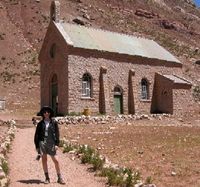Grace in unexpected places
On Friday night, I went to a Seattle Mariners baseball game. I love baseball, and a friend of mine couldn't use her ticket, which I gladly snapped up.
It was "Ladies' Night" at the ballpark, which included free give-aways of cheesy pink-and-white baseball visors and (I kid you not) potted plants. The featured event on the big screen was the story of two women who were chosen for a special shopping trip to the Mariners' team store, where they received...wait for it...a makeover! Featuring pink Mariners' jerseys! The derisive comments flowed abundantly in my little group. Nonetheless, there were two redeeming features (apart from the baseball game itself, of course).
First, the initial pitch was thrown by a local woman who, having recently summitted Mt. Everest, is now the youngest person to climb the highest peaks on all seven continents, at the amazing age of 20. That was pretty cool.
The second high point was, unexpectedly, the national anthem. The woman who performed it sang beautifully and simply. She spanned the famously difficult range of notes seemingly without effort or showy flourish, and her face had a radiant look as if she were singing for the sheer joy of it and not for the benefit of tens of thousands of spectators.
The U.S. national anthem has never really done much for me, with its story of waiting through a night of battle to see if the flag still stands. A musical celebration of "bombs bursting in air" seems almost indecent in the face of current world events and our country's troubling role in them. I've always thought it compared poorly to the proud, peaceful lyrics of my other national anthem, O Canada!, with its glowing hearts and lordly rivers (although to be fair, the French lyrics are completely different - Car ton bras sait porter l'epee, il sait porter la croix...yeah, stick that in Babel Fish and see what you get). Of course the U.S. is not alone in having a battle-themed national anthem - take the Marseillaise, after all: To arms, citizens! Form your batallions! March, march! Let the impure blood water our fields!*
But in any event, the almost transcendent performance of the national anthem on Friday night made me, for the first time in memory, hear the lyrics in a different light. I could imagine the glaring rockets and bursting bombs metaphorically rather than literally, as an assault not by physical weapons but by greed, intolerance, aggression and indifference. As she launched into the familiar final lines: Oh say does that star-spangled banner still wave O'er the land of the free and the home of the brave - I heard a new emphasis. Not, "Is our flag still standing after the night of battle?" but "This land, over which our flag flies - is it still the land of the free and home of the brave?" In other words, as we live through the dark night and look toward the dawn, the important question is not whether we will still be standing, but whether we will still have something worth standing up for.
Maybe this is what Francis Scott Key meant all along, and I'm just a little slow on the uptake. But nonetheless, as the singer hit and held the soaring high note on the word free, I confess I experienced an uncharacteristic welling of tears in the eyes.
* You think I'm making that up? Translate for yourself:
Aux armes, citoyens!
Formez vos bataillons!
Marchons! Marchons!
Qu'un sang impur
Abreuve nos sillons!

No comments:
Post a Comment